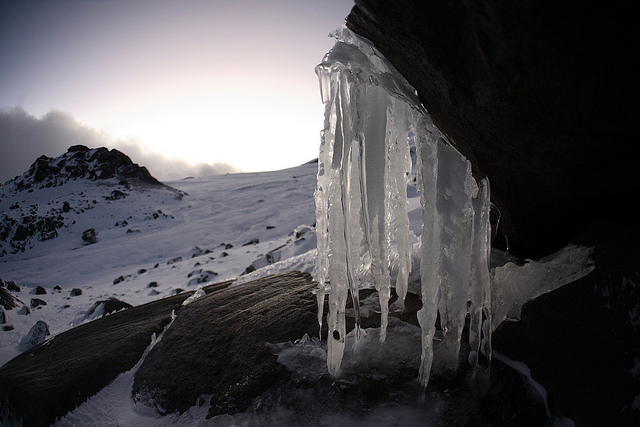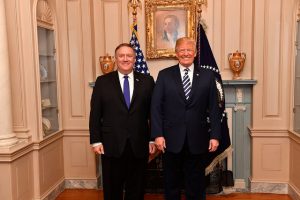by Jim Lobe
While this blog is devoted to U.S. policy toward the Middle East, it should come as no surprise to regular readers that I regard climate change as likely to be the greatest challenge faced by the United States and the world over for the coming century and beyond.
The most recent news, including the latest government report on how climate change is already impacting the United States, and the studies that came out three weeks ago regarding the apparently irreversible collapse of the West Antarctica ice sheet, clearly underline the rising stakes, not only from a strictly environmental point of view, but also with respect to national security. After all, as Tom Friedman and others have argued, the civil war in Syria owes much to the extended drought conditions that have prevailed in that country over the past decade and more, driving millions of mostly Sunni small farmers from the countryside into the big cities where they were unable to earn a decent living in fast-growing shanty towns that have mushroomed over that period. (Obviously, western-backed neoliberal economic policies and corruption didn’t help.) While that drought, like a similar phenomenon in central Mexico that has sent hundreds of thousands of people across international borders in search of work, may not be 100% provably attributable to global warming, there is sufficient consistency in the predictions by increasingly refined computer models developed by climatologists over decades to conclude that there is almost certainly a strong connection between the amount of carbon being pumped up into our atmosphere and these changes in weather patterns over significant swathes of our planet.
And, as the indefatigable Tom Engelhardt, in an essay about “climate change as a weapon of mass destruction“, requested of anyone in Wyoming to ask former Vice President Dick Cheney if they should happen to run into him:
How would he feel about acting preventively, if instead of a 1% chance that some country with weapons of mass destruction might use them against us, there was at least a 95% — and likely as not a 100% — chance of them being set off on our soil?
Of course, it’s Cheney and his neoconservative and right-wing friends (too often aided by liberal hawks like the Washington Post’s editorial board), who have consistently derided President Obama’s alleged timidity and failure to “lead” in foreign policy (by which they ordinarily mean using or threatening to use military force in dealing with any crisis). Indeed, just last week, in an interview with Fox News’ Sean Hannity, Cheney, who, next to George W. Bush, bears the greatest responsibility for the worst U.S. foreign policy debacle at least since the Vietnam War, remarked:
He’s a very, very weak president, maybe the weakest certainly in my lifetime. And I know from my own experience on a recent trip to the Middle East, spending several days talking with folks I’ve dealt with all the way back to Desert Storm, they all are absolutely convinced that the American capacity to lead and to influence events in that part of the world has been dramatically reduced by this president.
We’ve got a problem of weakness. It’s centered right in the White House.
This “weakness” is sometimes attributed by critics to Obama’s supposed left-wing worldview and/or naiveté. Arguing that Obama’s motivations are more cynical and political, others have noted its consistency with the general public’s allegedly “isolationist” tendencies and its disenchantment with the military “hammer”(that was used so promiscuously by Bush and Cheney), as expressed in countless surveys and polls.
In any event, this charge of Obama’s weakness, timidity, retreat, and lack of leadership has now become a neoconservative and Republican mantra repeated and recycled endlessly in the mass media as each new foreign policy challenge moves into the spotlight — from Benghazi to Beijing to Bergdahl. It has become the meta-narrative for analyzing Obama’s foreign policy, from which even many Democrats (watch Hillary Clinton carefully; it’s already out there that she opposed a deal to free Bergdahl) are now trying hard to distance themselves.
Of course, it is in this context that it’s important to ask how such a weak, timid, and “lead-from behind” president could also address climate change as he did earlier this week by taking executive action to curb emissions from coal-fired power plants — a move that appears to offer him no particular political advantage and may indeed prove counter-productive to his hopes of retaining Democratic control of the Senate. In his blog post at the National Interest, Paul Pillar, who, as National Intelligence Officer for the Middle East and South Asia, commissioned the pre-invasion study that predicted much of the fiasco that followed the Iraq invasion — only to be ignored by Cheney, Bush & Co. — was similarly struck by this apparent anomaly and wrote a blog post entitled “Leading from the Front on Carbon Dioxide.” It deserves more attention.
A constantly recurring theme in criticism of Mr. Obama’s foreign policy is that he allegedly is a weak leader, or when he leads does so only from behind. An action such as his recent move on power plant emissions highlights how such accusations, insofar as they are not just opposition for the sake of opposition, really aren’t about leadership at all but instead about disagreement on the substance of whatever issue is at hand.
Much criticism of the president has combined an image of him as a weak, stay-in-the-rear leader on foreign policy with a picture of an over-reaching, rule-flouting chief on domestic policy. Opponents will catalog the new rules on power plants in the latter category. Efforts to curb destructive emissions are ultimately a foreign policy problem, however, because Earth is a single planet with a single atmosphere. Pollution problems vary with the locale, and it may be sensible practical politics for the president to talk about respiratory problems among American children, but climate change is global. The heaviest lifting will involve getting China and other heavy polluters to do their part. It is a task as troubling and challenging as any that involve China using dashed lines on maps to make territorial claims.
The task is hard enough given the belief of developing countries that the United States and other Western nations already had their opportunity to develop and to become prosperous and to pollute with impunity as they did so. It would be discriminatory, according to this belief, for late developers to be subject for environmental reasons to more economic restraints than early ones. The least the United States can do, to keep this task from being any harder than it has to be, is to exercise leadership by setting an example and cleaning up its own act.
President Obama also gets criticized for playing small ball in foreign policy, a criticism he partly brings on himself by talking about hitting singles and doubles rather than home runs. Stopping climate change is not small ball. Saving the planet would be a home run. Small ball is played by those, Democrats as well as Republicans, who would rather talk about the health of the coal industry in Kentucky than about the health of the planet. And small ball is played by those who cannot or will not see beyond the powering of most of the world’s economy through any means other than burning what alternative energy guru Amory Lovins has called “the rotten remains of primeval swamp goo.”
Photo: The melting of Mexico’s Orizaba glacier is another consequence of global warming. Credit: Mauricio Ramos/IPS






Perhaps the saving grace in this, is the Science is moving along with research that continues improving the alternative energy sources, the ones that will power the world of tomorrow, if the idiots don’t blow the world up first.